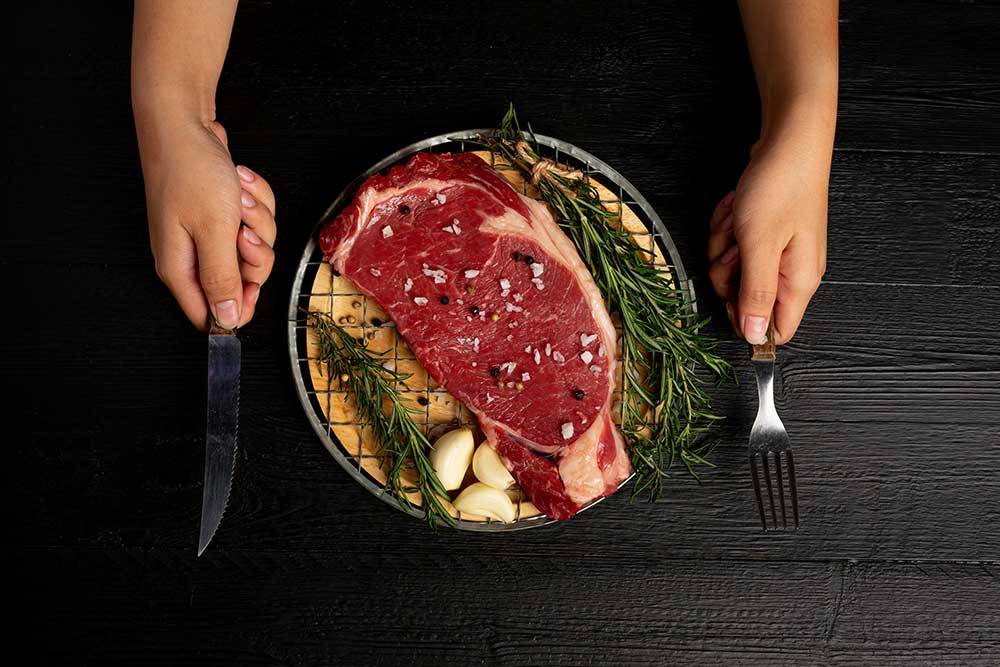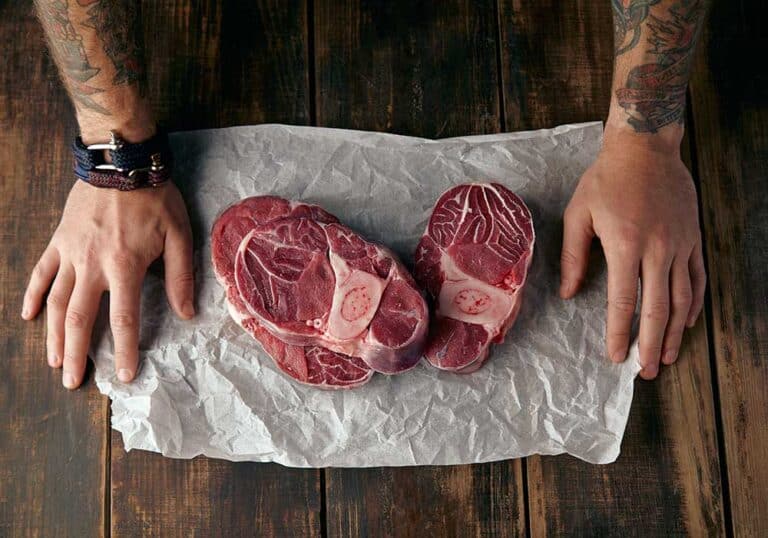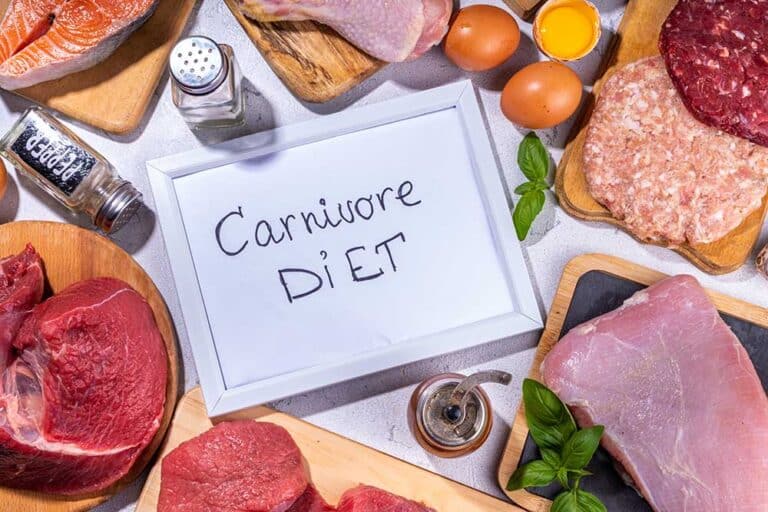Understanding the Carnivore Diet
What is the Carnivore Diet?
The carnivore diet is a highly restrictive eating plan that consists entirely of meat, fish, eggs, and small amounts of low-lactose dairy. All other food groups, including fruits, vegetables, grains, and nuts, are completely excluded. The primary aim of this diet is to consume zero carbohydrates, basing nutrition solely on animal products. Advocates of the diet claim it can aid in weight loss, mood stabilization, and blood sugar regulation (Healthline).
Typical Foods in the Carnivore Diet:
- Beef
- Chicken
- Pork
- Fish
- Eggs
- Some low-lactose dairy products like hard cheeses
For more information on the foods included in this diet, visit our carnivore diet foods list page.
Claims and Controversies
Claims
Proponents of the carnivore diet assert several health benefits:
- Weight Loss: By cutting out carbohydrates, the diet is believed to help people lose weight by promoting ketosis, a metabolic state where the body burns fat for fuel.
- Mood and Mental Health: Some followers report improvements in mood and mental clarity, suggesting that the diet helps with depression and anxiety.
- Blood Sugar Regulation: The absence of carbs is said to help stabilize blood sugar levels, potentially benefiting those with diabetes.
Controversies
Despite the claimed benefits, the carnivore diet is highly controversial and criticized for several reasons:
-
Nutrient Deficiencies: By excluding all plant-based foods, the diet lacks essential micronutrients and beneficial plant compounds found in fruits, vegetables, legumes, and whole grains. This can lead to potential deficiencies in vitamins and minerals.
-
High in Saturated Fat and Cholesterol: A diet heavy in meat, particularly red and processed meats, is high in saturated fat, cholesterol, and sodium, which are linked to an increased risk of heart disease and other health issues (Health).
-
Lack of Fiber: The total exclusion of fruits and vegetables results in insufficient fiber intake, which is crucial for gut health. A lack of fiber can lead to digestive issues and negatively impact the gut microbiome.
-
Long-Term Health Risks: Given its restrictive nature, long-term adherence to the carnivore diet can increase the risk of serious health conditions such as colorectal cancer and heart disease.
To explore these disadvantages further, visit our carnivore diet side effects page.
By understanding both the claims and controversies surrounding the carnivore diet, individuals can make more informed decisions about whether or not this eating plan aligns with their health and wellness goals. For a more detailed breakdown of a typical meal, check out our carnivore diet meal plan and carnivore diet recipes.
Nutritional Aspects of the Carnivore Diet
Comprehending the nutritional aspects of the carnivore diet is vital for anyone considering this unique approach to eating. This section delves into the essential nutrients provided by the diet, as well as the potential deficiencies one might encounter.
Essential Nutrients
The carnivore diet, consisting exclusively of meat, fish, eggs, and small amounts of low-lactose dairy, provides certain essential nutrients. These include high-quality protein, various vitamins, and minerals that are vital for maintaining overall health.
Key Nutrients in the Carnivore Diet:
| Nutrient | Source | Importance |
|---|---|---|
| Protein | Meat, Fish, Eggs | Muscle repair, enzyme function |
| Vitamin B12 | Meat, Fish, Eggs | Red blood cell formation, neurological function |
| Iron | Red Meat, Fish | Oxygen transport, energy production |
| Zinc | Meat, Fish | Immune function, wound healing |
| Creatine | Red Meat, Fish | Energy production in muscles |
Potential Deficiencies
Despite providing several essential nutrients, the carnivore diet is highly restrictive and may lead to deficiencies in certain micronutrients and beneficial plant compounds. This can have significant effects on one’s health. The absence of fruits, vegetables, legumes, and whole grains in the diet means missing out on fiber, antioxidants, and various other vital nutrients.
Potential Nutrient Deficiencies:
| Nutrient | Function | Deficiency Risks |
|---|---|---|
| Fiber | Gut health, digestion | Constipation, gut inflammation |
| Vitamin C | Antioxidant, collagen synthesis | Scurvy, weakened immunity |
| Vitamin K | Blood clotting, bone health | Increased bleeding, bone fractures |
| Magnesium | Muscle function, heart health | Muscle cramps, cardiovascular issues |
| Antioxidants | Cellular protection | Increased oxidative stress, chronic diseases |
Sources and Deficiency Context:
- Fiber, important for gut health, is absent, leading to possible constipation and imbalance in gut bacteria.
- Vitamin C deficiency can result from the lack of fruits and vegetables, posing risks of scurvy and weakened immune function.
- Magnesium, found in leafy greens and legumes, is critical for muscle function and heart health. Its deficiency can cause muscle cramps and cardiovascular issues.
For those considering the carnivore diet, it is essential to weigh the risks and benefits and consider supplementation or alternatives to avoid potential health risks. More information on how to create a balanced carnivore diet meal plan will provide further guidance.
Health Implications of the Carnivore Diet
Short-Term Effects
The carnivore diet involves eliminating all plant foods and exclusively consuming meat, fish, eggs, and small amounts of low-lactose dairy products. This restrictive approach can lead to several notable effects in the short term, impacting both weight and health.
Weight Loss: One of the most immediate short-term effects is weight loss. By eliminating high-sugar and refined carbohydrate foods, individuals may experience significant reductions in body weight (Harvard T.H. Chan School of Public Health). This is primarily due to the lack of easily digestible carbohydrates, which can lead to a lower intake of calories.
Energy Levels and Mental Clarity: Some people report an increase in energy levels and mental clarity. The high fat and protein intake can potentially provide a stable energy source. However, these effects are subjective and can vary significantly between individuals.
Digestive Changes: Adopting a carnivore diet can lead to noticeable changes in digestion. Without plant fiber, some individuals may experience constipation, while others might find an improvement in digestive issues like bloating or irritable bowel syndrome.
| Short-Term Effects | Description |
|---|---|
| Weight Loss | Reduction in body weight due to the elimination of high-sugar and refined carbohydrate foods. |
| Increased Energy | Some individuals report higher energy levels due to fat and protein intake. |
| Digestive Changes | Changes in digestion, such as constipation or relief from bloating. |
Long-Term Concerns
Despite the potential short-term benefits, the long-term implications of the carnivore diet are a cause for concern.
Nutrient Deficiencies: The exclusion of plant foods from the diet can result in a lack of essential nutrients such as fiber, carotenoids, and polyphenols. These nutrients are crucial for maintaining overall health and reducing the risk of chronic diseases. For instance, fiber is essential for digestive health and is found in fruits, vegetables, and whole grains.
Health Risks: Long-term adherence to a diet high in red and processed meats can increase the risk of serious health conditions, including colorectal cancer and heart disease (Health). Elevated consumption of red meat has also been linked to higher levels of LDL cholesterol, which is a risk factor for cardiovascular disease.
Other Health Issues: Additional long-term risks associated with the carnivore diet include kidney stones, kidney dysfunction, osteoporosis, and gout (Woman’s World). These conditions can arise due to the high protein and low nutrient profile of the diet.
| Long-Term Concerns | Description |
|---|---|
| Nutrient Deficiencies | Lack of essential nutrients like fiber, carotenoids, and polyphenols. |
| Increased Health Risks | Higher risk of colorectal cancer, heart disease, and elevated LDL cholesterol. |
| Other Health Issues | Kidney stones, kidney dysfunction, osteoporosis, and gout. |
The fleeting advantages of the carnivore diet may not outweigh the potential risks when examining its long-term impacts. It’s crucial to consider these health implications before deciding to follow this highly restrictive diet. For a more balanced approach, exploring various carnivore diet recipes and understanding the carnivore diet rules can be beneficial. Additionally, consider the benefits and potential side effects to make an informed choice.
Research Studies and Findings
Studies Supporting the Diet
Recent research studies have investigated the impact of the carnivore diet on various health markers. Participants reported high satisfaction levels with the diet, and the majority experienced improvements in chronic medical conditions and overall health status. Social impact was minimal, and medical providers’ support was perceived as neutral or supportive by most participants.
Another study from 2021 highlighted hormonal and weight changes linked to the carnivore diet. Participants observed substantial reductions in their Body Mass Index (BMI) after transitioning to this diet, indicating potential short-term weight loss benefits. The production of ketones, which are prevalent in this diet, can lead to faster fat burning, especially in stubborn areas such as the belly, hips, and thighs Woman’s World.
| Study | Year | Key Finding |
|---|---|---|
| PMC Survey | 2021 | High satisfaction, improved chronic conditions |
| Health Research | 2021 | Significant BMI reduction, improved weight loss |
| Woman’s World | 2021 | Faster fat burning due to increased ketone production |
For more personal experiences, check out these carnivore diet before and after stories.
Criticisms and Limitations
Despite these promising findings, there are several criticisms and limitations associated with the carnivore diet. According to Healthline, controlled studies to support claims of health benefits are lacking. Notably, the diet is extremely restrictive, consisting solely of meat, fish, eggs, and small amounts of low-lactose dairy. This restrictiveness can result in nutrient deficiencies, including the absence of fiber and essential plant compounds like antioxidants.
The long-term safety of the carnivore diet is also questioned (Healthline). Potential risks include heart disease and digestive issues, primarily due to the lack of necessary nutrients and the diet’s heavy emphasis on animal products.
Consider the following table detailing the common criticisms:
| Criticism | Detail |
|---|---|
| Lack of Controlled Studies | No substantial research backing the health claims |
| Nutrient Deficiencies | Missing fiber, antioxidants, and other essential nutrients |
| Long-Term Safety Concerns | Risks of heart disease, digestive issues |
While some people may see short-term benefits, it’s vital to weigh the potential long-term health risks. For a detailed look at the diet’s side effects, visit our page on carnivore diet side effects.
Understanding these studies and criticisms helps paint a balanced picture of the carnivore diet results, allowing you to make a well-informed decision. For more detailed guidance on what you can eat, explore our comprehensive carnivore diet foods list.
Success Stories on the Carnivore Diet
The carnivore diet has gained popularity for its potential health benefits. Numerous individuals have shared their transformative experiences, showcasing the possible outcomes of adopting this unique dietary approach.
Personal Experiences
Several people have reported remarkable results after switching to a carnivore diet. Joe Rogan, for instance, followed a variant known as the lion diet—consisting primarily of grass-fed beef, elk, eggs, and bacon. Joe noted a 12-pound weight loss, the disappearance of his gut, and sustained high energy levels without the typical carbohydrate-induced crashes (Doctor Kiltz).
Another notable example is Ruth Hovsepian, 59, who lost 105 pounds on the carnivore diet. She experienced relief from various health issues like a slow thyroid, rheumatoid arthritis, gout, hot flashes, and pain. Ruth also noticed a significant boost in her energy levels (Woman’s World).
In a study published in PMC, participants reported high levels of satisfaction with their overall health improvements:
- 95% noted better health
- 66-91% reported enhanced well-being
- 48-98% experienced improvements in various medical conditions
Additionally, respondents with diabetes observed significant benefits:
- BMI reduction: 4.3 kg/m²
- Decrease in glycated hemoglobin: 0.4%
- Reduced use of diabetes medication: 84-100%
Before and After Results
The following table highlights the dramatic changes experienced by individuals after following a carnivorous regimen:
| Individual | Weight Loss | Other Benefits |
|---|---|---|
| Joe Rogan | 12 lbs | High energy, no crashing |
| Ruth Hovsepian | 105 lbs | Relief from thyroid issues, rheumatoid arthritis, gout, hot flashes, and pain |
| Study Participants | – | Improved BMI, well-being, and medical conditions |
| Diabetic Respondents | – | Reduced BMI, glycated hemoglobin, medication use |
A report by Harvard experts revealed the following insights among a small sample of carnivorous dieters:
- 93% experienced weight loss
- 97% resolved gastrointestinal issues
- 96% reported better mental well-being
- 93% noted lowered blood pressure (Woman’s World)
These compelling stories and statistics offer a glimpse into the potential benefits of adopting a carnivorous eating plan. However, as with any diet, it’s essential to understand its risks and benefits. For more personal success stories and transformation details, explore our page on carnivore diet before and after.
For those considering this dietary approach, it’s recommended to review potential risks and benefits, understand what can you eat on the carnivore diet, and explore carnivore diet recipes for meal planning.
Considerations for Following the Carnivore Diet
Risks and Benefits
When considering the carnivore diet, it’s essential to weigh both the risks and benefits to determine if it aligns with your health goals. This highly restrictive diet focuses solely on animal products, eliminating entire food groups such as fruits, vegetables, and grains.
Benefits:
- Proponents claim improved digestion, clearer skin, and enhanced mental clarity.
- Some individuals experience significant weight loss due to the high protein and low carbohydrate nature of the diet.
- Reduced intake of processed foods and sugars may decrease inflammation and stabilize blood sugar levels.
Risks:
- The diet is extremely limited, potentially resulting in nutrient deficiencies, especially in vitamins C and E, fiber, and various phytonutrients found in plant-based foods (Healthline).
- High intake of red and processed meats has been associated with increased risks of colorectal cancer, heart disease, and other serious health conditions (Health).
- Elevated levels of LDL cholesterol and a higher risk of kidney stones, dysfunction, osteoporosis, and gout are potential long-term concerns (Woman’s World).
| Benefits | Risks |
|---|---|
| Improved digestion | Nutrient deficiencies |
| Weight loss | Increased risk of colorectal cancer and heart disease |
| Stabilized blood sugar | Elevated LDL cholesterol |
| Reduced inflammation | Higher risk of kidney stones, dysfunction, osteoporosis, and gout |
Sustainability and Alternatives
Sustainability:
- Maintaining the carnivore diet can be challenging due to its restrictiveness and the need for consistent access to high-quality animal products.
- Social situations such as dining out or attending events may pose difficulties, as the diet’s rigidity limits food choices.
- The diet’s long-term sustainability is questionable due to potential health risks and nutrient deficiencies.
Alternatives:
If the carnivore diet seems too extreme, consider less restrictive alternatives that still emphasize meat and protein while incorporating other food groups for a more balanced intake:
- Keto Diet: Focuses on high fat and moderate protein while limiting carbs. Includes vegetables, nuts, and dairy (carnivore diet meal plan).
- Paleo Diet: Emphasizes whole foods, lean meats, fruits, vegetables, and nuts, avoiding processed foods and grains (what can you eat on the carnivore diet).
- Low-Carb Diet: Similar to keto but with more flexibility in carbohydrate intake, allowing for a variety of plant-based foods.
| Diet | Description |
|---|---|
| Keto | High fat, moderate protein, low carbs; includes vegetables, nuts, and dairy. |
| Paleo | Whole foods focus; includes lean meats, fruits, vegetables, and nuts. |
| Low-Carb | Moderate approach to carbs; includes various plant-based foods. |
By understanding the risks, benefits, and sustainability of the carnivore diet, individuals can make informed decisions about their dietary choices. For more detailed information and personal accounts, check out our articles on carnivore diet benefits and carnivore diet before and after.
- About the Author
- Latest Posts
Johnnie D. Jackow Sr., the founder and CEO of Total Body Fitness, Worldwide, has a long-standing career in the fitness industry. He began as a certified personal trainer in the mid-90s and soon after authored his first weight loss book in 1998. This led to the launch of Total Body Fitness, Nationwide in the USA at the same time. Johnnie gained recognition as the fitness guru of his time, running infomercials on local TV late at night in Houston, Texas. Over the years, he has helped more than 40,000 individuals from all over the world achieve their health and fitness goals. With over 60,000 hours of documented training in integrative functional medicine, he completed his PhD in human physiology in 2010. His primary objective is to assist people in reaching their health and fitness goals through alternative approaches rather than relying solely on conventional medicine and pharmaceutical drugs. Today, with almost three decades of experience under his belt, Johnnie continues to be a leader in health and fitness.








